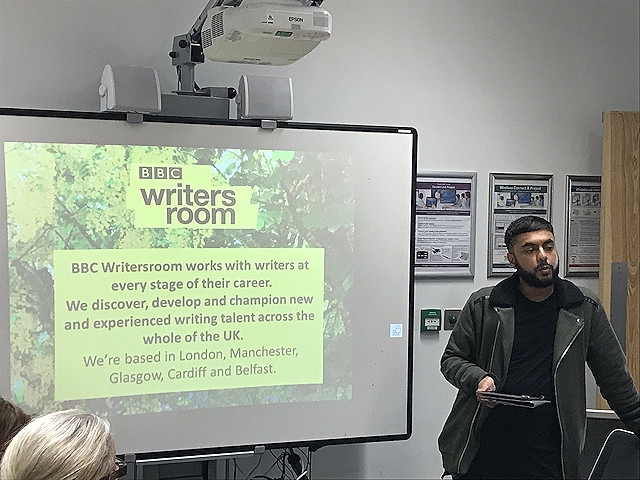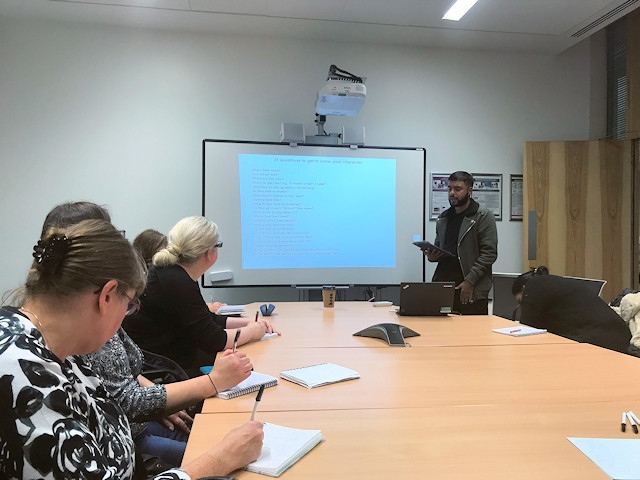Top Tips from BBC Writersroom at Rochdale’s Literature & Ideas Festival
Date published: 19 October 2018

BBC Writersroom
Usman Mullan hosted a sold-out BBC Writersroom event at Number One Riverside as part of Rochdale’s Literature and Ideas Festival on Wednesday (17 October).
Mr Mullan, Assistant Producer at BBC Writersroom North, shared invaluable top tips on how to get scripts noticed by the BBC as well as answering audience questions and explaining how writers become discovered across the UK.
Attendees learnt how the BBC commissioning works, what the Writersroom does, the opportunities available to writers and were shown the vast resources available to new writers on the Writersroom website.
Explaining how scripts get selected, Mr Mullan said: "You're selected on the originality of your voice - not your background.
“Great characters in a story are usually flawed and complex; make them feel distinctive and not cliché. My advice would be to write down three different words that describe your characters individual personality or traits, without repeating any for the next character. Each character should be completely different from the another to have a successful beginning, middle and end.
“I think the best opening scenes are the ones that show characters and their personality through only actions and no dialogue, for example the opening scene of Killing Eve where there is no dialogue for the first five minutes, yet her character comes across instantly through her actions. The audience are drawn to continue watching and discover why she acts this way.
”My advice to aspiring writers would be to look at the opportunities section on our website. The ‘Bodyguard’ script is currently available in our script library; looking at this will help you know the correct format of a script and how great storytelling is done.
“We don’t only look for new writers, we look for writers at any stage of their career. We just want to hear really interesting voices.”

10 Top Tips for Scriptwriting:
1. You must have good openings – hook the attention of your audience really early on. Within the first minute of your script you should ask an intriguing question that makes the audience want to stay and get answers.
2. Characters – need to be emotionally compelling, bigger than your concepts and drive your stories. Think visually and try to show the characters in action as actions sometimes speak louder than words (a good example of this is the first 5 minutes of ‘The Disappearance of Alice Creed’, 2009 where there is no dialogue).
3. Don’t always preface – set up and then introduce the characters or the story.
4. Beware of exposition / backstory – leave the audience to work things out themselves and don’t always go into too much detail. Push the audience into a scene and then abruptly take them out, everyone loves a cliff-hanger.
5. Coherence – you need to know the world of your story, the genre and the tone you want to write in.
6. Surprise your audience – what’s different about your story? Think of different perspectives and spring unusual choices on the audience.
7. Structure – your story must always be going somewhere. There should be a dramatic purpose for every scene.
8. Dialogue – don’t make your characters tell each other things that are already obvious. Say the maximum you can in the fewest words possible.
9. Passion – are you compelled to write the story? Don’t try to write something you think someone is looking for, you must not second guess the story you want to write.
10. Be yourself.
BBC Writersroom opens two submission windows a year that are genre specific to Comedy and Drama. Any medium of scriptwriting such as film, theatre, radio and TV for example can be submitted as long as it fits into one of these genres.
Around 14,000 scripts are submitted each year, with experts reading 10 pages from each script, and only 20 or less are then shortlisted for a development programme.
Mr Mullan concluded: “Send us a script but not before you are certain it’s ready. Your script should be the strongest it could possibly be before anyone has the chance to read it.”
Do you have a story for us?
Let us know by emailing news@rochdaleonline.co.uk
All contact will be treated in confidence.
Most Viewed News Stories
- 1Royton haulage firm fined after Rochdale dad went to work and didn’t come home
- 2Six men arrested in Rochdale child exploitation investigation
- 3Rochdale church to host Camerados public living room
- 4Suspended council candidate was ‘politically naive’ for appearing in George Galloway video, leader...
- 530 years of the GEM Appeal, a Rochdale-founded charity that has raised millions and changed the...
To contact the Rochdale Online news desk, email news@rochdaleonline.co.uk or visit our news submission page.
To get the latest news on your desktop or mobile, follow Rochdale Online on Twitter and Facebook.


